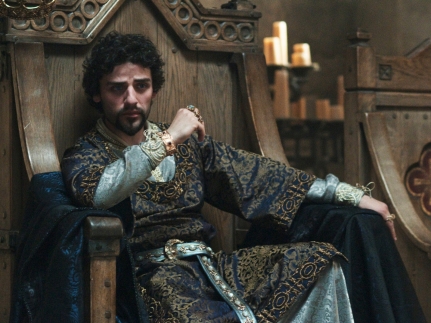A quick(ish) word about Prince John, the guy who would become King John I.
So, how much similarity is there between the real life King John and the petulant, moustache-twirling, cartoonish villain of pop culture? I’m so glad you asked.
John was not a nice man, but when it comes to how bad, and how good or bad a king he was, he has some defenders. Maybe King John was the victim of bad luck and bad press. That politics of State and Church influenced how he’s written up in history.

Sulky King John played by Oscar Isaac. (!!)
The problem with that theory is that there’s not much to contradict the reports of cruelty, lechery, cowardice, and two-faced untrustworthiness. Even if you take all the opinions written about him and dilute them to allow for all the haters, by all accounts he was a pretty awful person.
Now, I realize that in the middle ages, the standard of “awful” was set pretty low when it comes to the people in charge. It was a bloodthirsty time. And anyone who thinks there wasn’t all kinds of double-dealing going on between kingdoms has never watched Game of Thrones read a history book. Taxes are unfair, laws are unfair, the Crown and the Church are always jockeying for power…
The thing with John was that even his contemporaries were often outraged by his actions. For one thing, it’s not nice to try to take your brother’s throne while he’s off trying to reclaim Jerusalem for Christianity. At least, not more than once. But he also kept political prisoners in horrible conditions, and instead of ransoming captive nobles, he’d have them killed—more than once by starving them to death, which was considered cruel and unusual even before that was a thing. Especially when you do it to the wife and child of your former friend and ally because he stopped agreeing with you.
Let’s see. The nobles also weren’t nuts about the way he felt entitled to their wives and daughters. (This one I take with a grain of salt.) And he’s also supposed to have had a hand in the death of his nephew (and potential threat to his throne) while he was in his custody. Shakespeare wrote a play about it, so it must be true.
And that’s just the stuff that the nobles were irked about. He extorted exorbitant amounts of money from his subjects through taxes, fees, and penalties, and his policies for extracting taxes were torturous—literally, especially for the Jews.
When it came to war, he wasn’t afraid to go, but faced with an attacking force, King John repeatedly withdrew from a fight—with or without his own men. He’d ride off in the opposite direction from the enemy and be three leagues away before his troops realized he’d abandoned them on the battlefield.
Was he completely ineffective as a king? Well, recordkeeping became a thing during his reign. (Because you don’t know what to tax someone if you don’t know what they own.) He fed and dressed his men pretty well. So, he might abandon you on the battlefield, but he put on a good spread.
It wasn’t that he wagged expensive wars and fought with the Church and raised taxes, it was that he was so cruel and treacherous about it. Even his own people considered him untrustworthy at best.
You can see how when the storytellers of the 19th century romanticized the middle ages for their stories about Robin Hood, Prince John was easy to seize upon as a villain because there’s a lot of material there to work with. Fictional Prince John is, when it comes down to it, fictional, more or less exaggerated depending on the type of story.

Let’s be real. Robin Hood and Prince John…they’re kind of like Doctor Who. Your first one will always be your favorite.